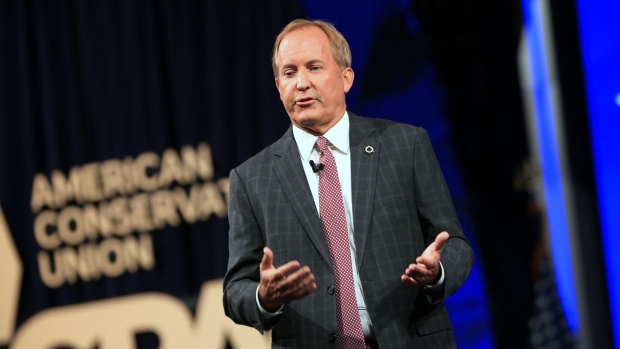Mar 3, 2022
Bush Family Legacy Is at Stake in Texas Attorney General Race
, Bloomberg News

(Bloomberg) -- George P. Bush won a chance to extend his family’s Texas dynasty by pushing the race for the Republican nomination for attorney general to a runoff.
The campaign against incumbent Ken Paxton will test how Bush’s brand plays in the country’s biggest red state, which has taken a hard right turn on many social issues -- and where the GOP is deeply in thrall to former President Donald Trump.
Paxton has Trump’s endorsement and a national profile after he sued to overturn the 2020 election results, but Bush has also cozied up to the former president and boasted that he’s the only family member whom Trump likes. Despite Bush’s creation of a beer koozie that bears that boast, Trump spokesman Taylor Budowich said the former president will stand by his endorsement of Paxton.
Bush will benefit from name recognition, even as the family ties may leave him vulnerable to criticism that his style isn’t conservative enough for Texas.
“I’m blessed to be a Bush, but Texans know me as my own man for seven years serving them as land commissioner, and as a candidate to be our top attorney with my own ideas,” Bush told Bloomberg News shortly before the March 1 primary.
Paxton won about 43% of the vote, leaving him short of the 50% threshold needed to avoid the May 24 runoff. Bush came in second with 23%. Two other candidates together garnered 35% -- meaning if enough of their voters support Bush, he could topple Paxton, who has been dogged with ethics scandals.
“Texas deserve better,” Bush said in the interview. “Let’s clear the air of suspicion and go with someone who can just hit the reset button and beat Democrats.”
Bush is seen as friendlier to the business community than Paxton, according to Cal Jillson, a political science professor at Southern Methodist University in Dallas. That’s because Paxton’s push for socially conservative policies has sometimes conflicted with corporate interests. For example, just last week Paxton issued a legal opinion that gender-affirming medical or surgical treatment for transgender youth constituted child abuse.
“The business community doesn’t like that kind of stuff, because they are employee based. Issues of race, ethnicity, gender, let alone transgender rights, are disconcerting for the business community,” Jillson said. “George P. would be smoother for them.”
The candidates have few disagreements over policy issues. Both promise to fight Washington overreach, crack down on illegal immigration and support law enforcement. The most striking difference between the men is their views of Trump’s false claims that the 2020 election was rigged.
Paxton spoke at the Jan. 6 Trump rally that preceded the invasion of the Capitol, and said on Twitter that morning that “A lot of voters, as well as myself, believe something went wrong in this election.” The Dallas Morning News reported that in October last year, he agreed with a questioner at an event in El Paso that Trump was the rightful winner of the 2020 election and Biden’s presidency amounts to an “overthrow.”
Bush, for his part, silently affirmed that he believes Biden won the election by raising his hand in response to a question during a campaign debate.
But with many Republicans believing Trump’s untruths, Bush has focused his campaign on ethics questions surrounding Paxton, questioning the incumbent’s fitness for office and ability to beat a Democrat in the general election given his baggage.
Paxton faces a 6-year-old securities-fraud indictment and claims of misconduct from former top lieutenants who say their boss abused his power to help out a donor. He has denied wrongdoing, and says the accusations are politically motivated. His campaign didn’t respond to a request for comment on his race against Bush.
In an interview with Dallas-area radio station 660 AM, Paxton said that Bush is focused on the ethics issues because he doesn’t have a track record of his own.
“If conservatives unite, which I think they will and they should, we can end the Bush dynasty,” Paxton said. “He doesn’t ever talk about his agency or what he’s done in office. He talks about what he’s going to do and how bad I am. And he doesn’t even really say I’ve done a bad job in my office, I’m just a bad person.”
Bush, 45, is the son of former Florida governor Jeb Bush, the nephew of former Texas governor and U.S. President George W. Bush, and the grandson of former President George H.W. Bush. Beginning when he was just 12, he took the stage at the Republican National Conventions in 1988, 1992 and 2000 to support his grandfather’s and uncle’s presidential runs.
He taught in a Miami public school for one year after college, then got a University of Texas law degree. He clerked for a federal judge, was a Navy Reserve officer in Afghanistan and worked at a real-estate private-equity firm.
In 2014, he won election as commissioner of the Texas General Land Office, putting him in charge of managing public lands, and was re-elected four years later. His time was marked by criticism over efforts to overhaul the Alamo historic site in San Antonio and accusations that he snubbed Democratic areas when distributing federal recovery funds for Hurricane Harvey, which flooded Houston in 2017.
Paxton has led the state’s crusade against what he calls federal meddling. He has sued the Biden administration repeatedly, and filed a failed lawsuit seeking to overturn the 2020 election results in four states.
“Paxton plays a very powerful political role,” said Mark Jones, a political science professor at Rice University in Houston. He is “one of the principal Texas warriors fighting the Democrats in Washington.”
Last month, Paxton sued Meta Platforms Inc. over facial recognition data stored by Facebook and Instagram. And in January, his office filed its third lawsuit against Google, saying the company monitored consumers’ locations even when users thought they had turned off the tracking feature.
While the 59-year-old Paxton has avoided trial on the securities-fraud indictment and has dismissed the misconduct claims from his former aides, the Associated Press has reported the FBI is investigating the whistleblowers’ complaint.
“Let’s let the process play out, let the FBI investigate,” Bush said. “But Texas deserves better.”
The Democratic primary is also headed to a runoff. Rochelle Garza, a former American Civil Liberties Union lawyer, finished first with 43%, but counting continues to determine the runner-up. A Democrat hasn’t won statewide office since 1994.
In the Republican primary’s first round, Eva Guzman, a former state supreme court justice, and Rep. Louie Gohmert received 18% and 17% of the vote. Much of their support could migrate to Bush, according to Patrick Flavin, a political science professor at Baylor University in Waco.
“Paxton might be in real danger of losing,” he said. “It will be a close runoff.”
©2022 Bloomberg L.P.







